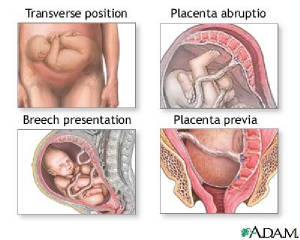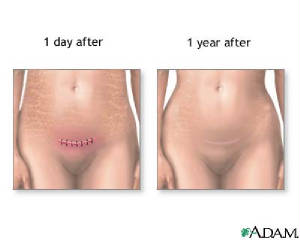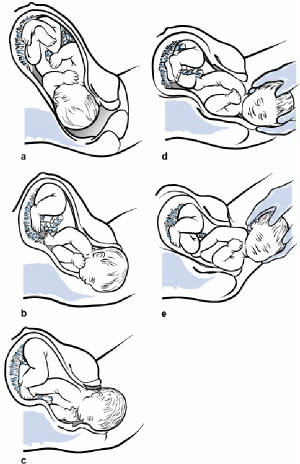|
LABOUR OPTIONS:
-
External Cephalic Version - is a procedure used to turn a fetus
from a breech position or side-lying position into a head-down (vertex) position before labour begins. It is done most
often before labour begins, generally around 36-37 weeks.
-
Vaginal Delivery
-
Vaginal Birth After Caesarean Section (VBAC) - Vaginal childbirth
by a woman who has had a surgical delivery (caesarean section) in the past.
-
Caesarean Section - is a form of childbirth in which a
surgical incision is made through a mother's abdomen and uterus to deliver one or more babies. It is usually
performed when a vaginal delivery would put the baby's or mother's life or health at risk, although in recent times it has
been performed upon request.
Symptoms of Pregnancy:
-
Backache - As a woman's weight increases, her balance changes, therefore,
straining her back. Pelvic joints that begin to loosen in preparation for childbirth also contributeS to this back strain.
A support brace, a firm mattress and flat shoes help.
-
Constipation - Increased pressure from the pregnancy on the rectum and intestines can
interfere with digestion and subsequent bowel movements. In addition, hormone changes may slow down the food being processed
by the body. Increasing fluids, regular exercise, and increasing the fiber in your diet are some of the ways to prevent constipation.
Always check with your physician before taking any medication for this condition.
-
Skin Changes - Due to fluctuations in hormone levels and often disappears after
delivery. A dark line frequently appears down the middle of the abdomen.
-
Nausea and Vomiting - About half of all pregnant women experience
nausea and sometimes vomiting (morning sickness) in the first trimester. The cause of morning sickness may be due to
the changes in hormone levels during pregnancy. Morning sickness seems to be aggravated by stress, traveling and certain foods
high in protein and fat. A diet high in complex carbohydrates (such as whole wheat bread, pasta, bananas, and green, leafy
vegetables) may help reduce the severity of the nausea.
- Hemorrhoids - Because of increased pressure on the rectum and perineum and the increased
likelihood of becoming constipated as the pregnancy progresses, hemorrhoids are common in late pregnancy. Always check with
your physician before using any medication to treat this condition.
- Varicose Veins - Swollen, purple veins are common in the legs and around the
vaginal opening during late pregnancy. In most cases, varicose veins are caused by the increased pressure on the legs and
the pelvic veins and increased blood volume.
- Leg Cramps
- Fatigue - Due to the body working overtime to provide a nourishing environment
for the fetus.
- Anemia - Anemia is a reduction in the oxygen-carrying capability of red blood cells
and is usually due to low iron levels.
- Urinary Frequency

|
 |
|
|
|
 |
|



Headache - Hormonal changes may be the cause of headaches during pregnancy, especially
during the first trimester. Rest, proper nutrition, and adequate fluid intake may help alleviate headache symptoms.
Yeast Infections - Due to hormone changes and increased vaginal discharge, a
pregnant woman is more susceptible to yeast infections. Yeast infections are characterized by a thick, whitish discharge from
the vagina and itching. Yeast infections are highly treatable. Always consult your physician before taking any medication
for this condition.
Heartburn and Indigestion - Caused by pressure on the intestines and stomach.
It can be prevented or reduced by eating smaller meals and avoiding lying down shortly after eating.
Bleeding Gums - Gums may become more spongy as blood flow increases during pregnancy,
causing them to bleed easily. A pregnant woman should continue to take care of her teeth and gums and go to the dentist for
regular checkups.
Swelling Fluid Retention - Mild swelling is common during pregnancy. Lying on
the side, elevating the legs, and wearing comfortable shoes may help to relieve the swelling.
|
 |
|
|
|
